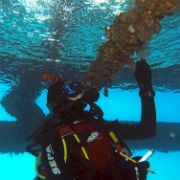Med Vantage: Pioneering the Field of Mediterranean Studies
In antiquity, half of the Jewish world spoke Greek – the dominant language and culture in the Mediterranean basin. Today, despite a 200-kilometer-long coastline stretching along the Mediterranean Sea, Israel is not commonly viewed by the world as a Mediterranean society. Tel Aviv University historians are changing that outlook, and in the process strengthening present-day ties with Israel’s Mediterranean neighbors, in particular Greece.
TAU scholars train a long gaze upon the Mediterranean region. Looking beyond artificially delineated time periods, and beyond the borders of modern nations – Israel, Greece, Italy, Turkey, they see large-scale phenomena and processes. Migration, trade, status of women, and development of language and governance, among others, are studied along the continuum of human habitation in the Mediterranean region as a whole. This outlook links the history of Israel, on a deep level, with that of other Mediterranean countries whose coastlines hug the sea.
The physics of history
The two dozen faculty members, doctoral students and post-doctoral researchers specializing in Mediterranean civilization at TAU also breach traditional barriers between humanities and science studies to take an interdisciplinary approach to the subject matter.
For example, Prof. Irad Malkin, co-director of TAU’s Center for Mediterranean Civilizations project and incumbent of the Maxwell Cummings Family Chair for the Study of Mediterranean History and Culture, melds the exact sciences, social sciences and humanities in his approach to the study of Greek history. In his recently published book, A Small Greek World: Networks in the Ancient Mediterranean (Oxford University Press), Prof. Malkin employs physics theories of synchronicity and network dynamics to investigate how links and hubs multiply to allow a flow of civilizational content and notions of identity, and how complex systems spontaneously self-organize. He examines how and why loosely connected, decentralized city-states and trading stations – spanning from the Black Sea to the Western Mediterranean – organized and self-identified to create the social and cultural network that we know as ancient Greece.
Other cross-disciplinary research topics being pursued at the School of History and the Chaim Rosenberg School of Jewish Studies, both of the Lester and Sally Entin Faculty of Humanities, include spatial perception, music and notions of foreignness in the ancient Mediterranean.
Global attention
The international impact of TAU research in the field is high: the School of History’s Mediterranean Historical Review was recently ranked 18th in the world in citations and influence among peer-reviewed history journals by Thomson Reuters Journal Citation Reports. The Review reaches 30,000 researchers at 1,600 libraries internationally, and many thousands online. Historians are not the only ones interested: Prof. Malkin’s book on ancient Greece motivated the Greek Ambassador to Israel, Mr. Kyriakos Loukakis, to initiate a special evening at the University, attended by Greek embassy officials and TAU historians.
TAU also recently hosted scholars from around the world to discuss the ancient Israel-Greek relationship. This conference was the first of its kind to examine the constitutive narratives and comparable world views of the two civilizations before the age of Alexander the Great, with an emphasis on myth, such as Iphigeneia and Jephthah’s daughter; trade among the Phoenicians, Greeks, and Hebrews; archaeology and chronology; the role of human connectors, or prophets, poets, artisans, mercenaries; and notions of authority and covenant.
At a time when Israel’s closest neighbors are in deep political upheaval, and relations with Turkey are only now on the mend, the nurturing of academic cooperation with southern European Mediterranean partners such as Greece is important on a number of levels. Through acknowledging a shared past, ties can become stronger. TAU historians are helping to foster relations and generate good will by looking at our common past. Their approach is helping anchor Israel as a Mediterranean society.






